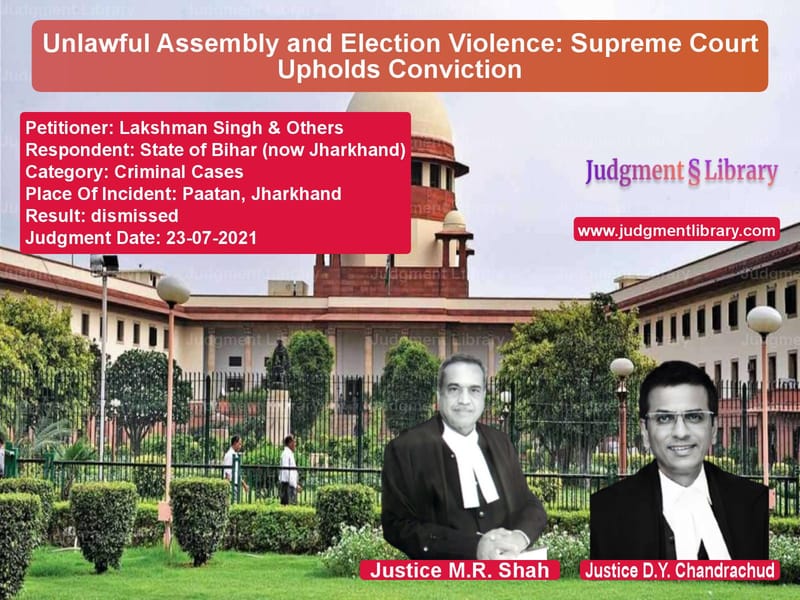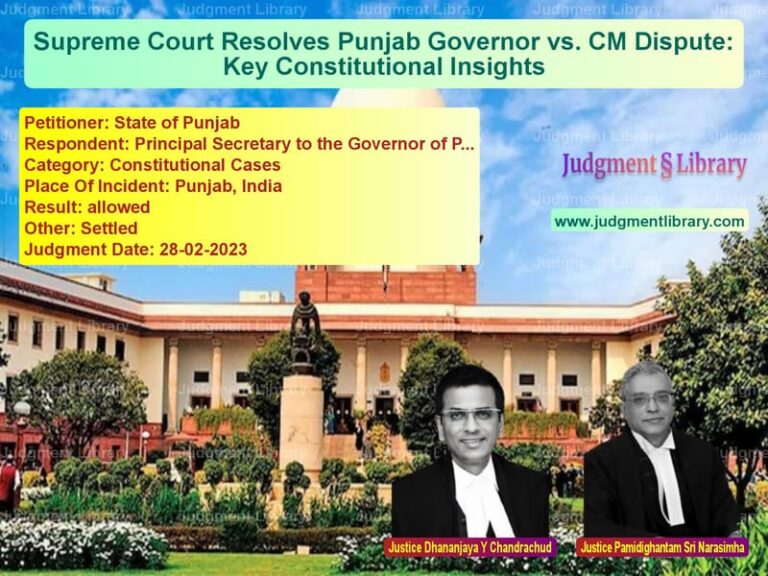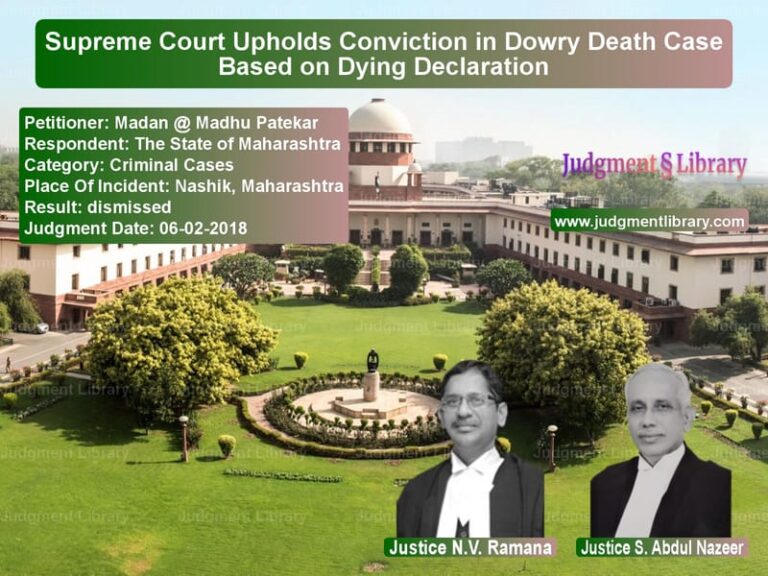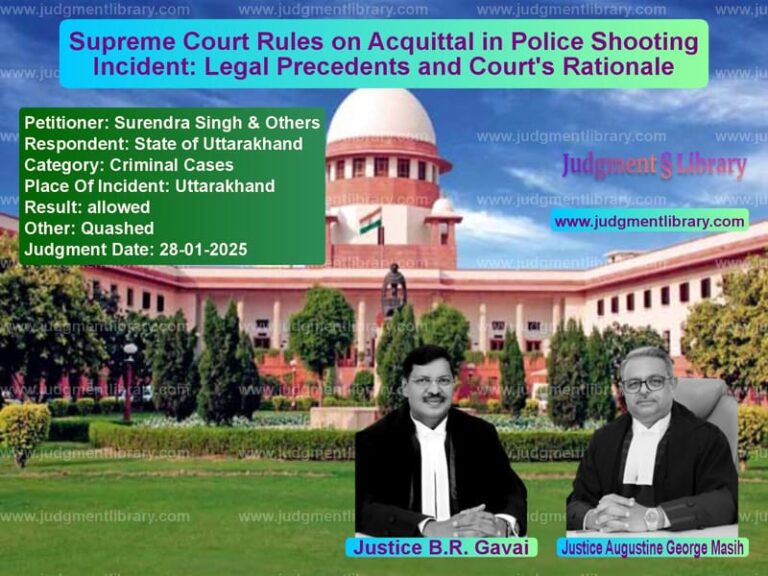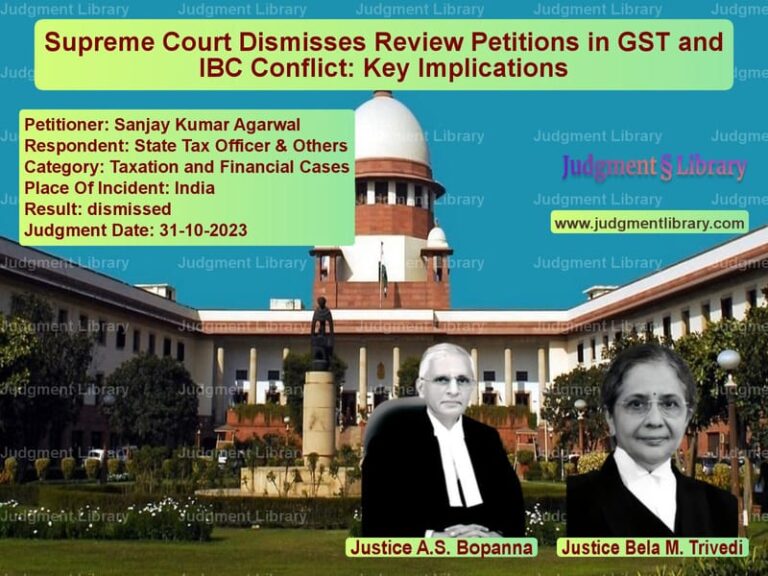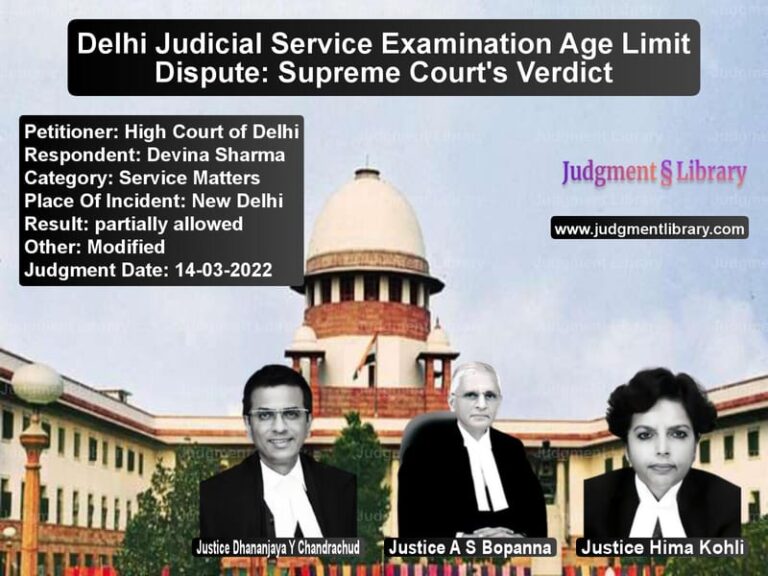Unlawful Assembly and Election Violence: Supreme Court Upholds Conviction
The Supreme Court of India, in its judgment dated 23rd July 2021 in the case of Lakshman Singh & Others v. State of Bihar (now Jharkhand), upheld the conviction of multiple accused persons for their involvement in election-related violence. The judgment, delivered by M.R. Shah and D.Y. Chandrachud, reinforces the importance of maintaining law and order during elections and upholds the principles of free and fair voting as a fundamental democratic right.
The case revolved around an incident during the general elections where a group of accused, allegedly part of an unlawful assembly, assaulted election workers and attempted to snatch voter slips. The Supreme Court reaffirmed the principle that members of an unlawful assembly can be held liable for the collective actions of the group, even if they did not individually participate in all aspects of the crime.
Background of the Case
The case dates back to 26th November 1989, when an election-related incident occurred in Golhana Booth No. 132 under Paatan Police Station. The prosecution alleged that a group of 16 accused persons arrived at the polling station armed with sticks and country-made pistols. The first informant, Rajeev Ranjan Tiwari (PW8), was working as an election worker for the Bharatiya Janata Party (BJP), issuing voter slips. The accused allegedly asked him to hand over the voters’ list and, upon refusal, physically assaulted him.
Read also: https://judgmentlibrary.com/bail-conditions-and-victim-compensation-supreme-courts-landmark-ruling/
During the scuffle, PW10, Priya Ranjan Tiwari, the brother of the informant, attempted to intervene but was shot at by accused Dinanath Singh. Another accused, Ajay Singh, also fired at Dinesh Tiwari (PW12). The prosecution further alleged that accused Hira Singh forcibly took away wristwatches from PW8 and PW10.
The police registered an FIR at 2:00 PM on the same day, charging the accused under Sections 147, 148, 149, 307, 326, 324, 323 of the IPC and Section 27 of the Arms Act. After an investigation, a chargesheet was filed against 15 accused, and the case was committed to trial.
Legal Issues Before the Court
- Whether the accused were part of an unlawful assembly with the common object of disrupting the election process.
- Whether individual roles needed to be established in cases of rioting and unlawful assembly.
- Whether the conviction of the accused under Sections 323 and 147 IPC was justified.
- Whether the trial court and High Court properly assessed the evidence.
Arguments by the Appellants
The accused, represented by Senior Advocate Manoj Swarup, contended:
- The trial court and High Court erroneously convicted them without properly evaluating the evidence.
- The prosecution witnesses, including PW8, PW10, and PW5, were not independent and belonged to the same political faction.
- The prosecution failed to establish that the accused had a common object of disrupting the elections.
- There was no recovery of voter slips, and the alleged motive of snatching the voter list was not proved.
- The trial court imposed an excessive sentence despite the fact that most of the injuries were minor.
Arguments by the Respondents
The prosecution, represented by Additional Advocate General Arunabh Chowdhury, countered:
- The case was supported by multiple injured eyewitnesses (PW8, PW10, PW5) whose presence at the scene was natural.
- The accused formed an unlawful assembly and attempted to snatch the voter list, a direct attack on the electoral process.
- Several witnesses identified the accused as being armed and actively involved in the attack.
- The principles of rioting and unlawful assembly did not require individual roles to be established.
- Convictions were supported by medical evidence, including injury reports of the victims.
Supreme Court’s Observations
The Supreme Court ruled in favor of upholding the conviction, making the following key observations:
- The prosecution had successfully proved the presence and participation of the accused beyond reasonable doubt.
- The injuries sustained by PW8, PW10, and PW5 were corroborated by medical reports.
- The accused had formed an unlawful assembly with a common object of disrupting the election process, which satisfied the requirements of Sections 147 and 149 IPC.
- As per the ruling in Mahadev Sharma v. State of Bihar, every member of an unlawful assembly is liable for rioting, even if they did not directly commit violent acts.
- Testimonies of injured witnesses carry greater evidentiary weight and should not be discarded without strong reasons.
Final Verdict
The Supreme Court dismissed the appeals and upheld the conviction of the accused under Sections 323 and 147 IPC. The Court ruled:
- The accused were guilty of rioting and causing hurt.
- Their participation in an unlawful assembly with a common objective was evident.
- The medical evidence and testimonies of the injured witnesses corroborated the prosecution’s claims.
- The accused were sentenced to six months of simple imprisonment, a lenient punishment given the gravity of the offense.
Impact of the Judgment
The ruling has significant implications for electoral law and public order:
- Reinforces Free and Fair Elections: The judgment sends a strong message that attempts to disrupt elections will be dealt with seriously.
- Strengthens Anti-Rioting Provisions: The case reaffirms that being part of an unlawful assembly is a punishable offense.
- Upholds Rule of Law: The ruling establishes that political or electoral violence will not be tolerated.
- Clarifies the Concept of Common Object: It demonstrates that direct involvement in violence is not required for conviction under rioting laws.
Conclusion
The Supreme Court’s decision in Lakshman Singh & Others v. State of Bihar (now Jharkhand) sets a crucial precedent in cases of electoral violence. It underscores the necessity of upholding democratic principles and ensures that no individual or group can undermine the electoral process through coercion or violence.
By reaffirming the rule of law and strengthening protections against unlawful assemblies, the judgment serves as a warning against any attempts to disrupt free and fair elections in India.
Petitioner Name: Lakshman Singh & Others.Respondent Name: State of Bihar (now Jharkhand).Judgment By: Justice M.R. Shah, Justice D.Y. Chandrachud.Place Of Incident: Paatan, Jharkhand.Judgment Date: 23-07-2021.
Don’t miss out on the full details! Download the complete judgment in PDF format below and gain valuable insights instantly!
Download Judgment: lakshman-singh-&-oth-vs-state-of-bihar-(now-supreme-court-of-india-judgment-dated-23-07-2021.pdf
Directly Download Judgment: Directly download this Judgment
See all petitions in Bail and Anticipatory Bail
See all petitions in Attempt to Murder Cases
See all petitions in Fraud and Forgery
See all petitions in Judgment by Mukeshkumar Rasikbhai Shah
See all petitions in Judgment by Dhananjaya Y Chandrachud
See all petitions in dismissed
See all petitions in supreme court of India judgments July 2021
See all petitions in 2021 judgments
See all posts in Criminal Cases Category
See all allowed petitions in Criminal Cases Category
See all Dismissed petitions in Criminal Cases Category
See all partially allowed petitions in Criminal Cases Category

